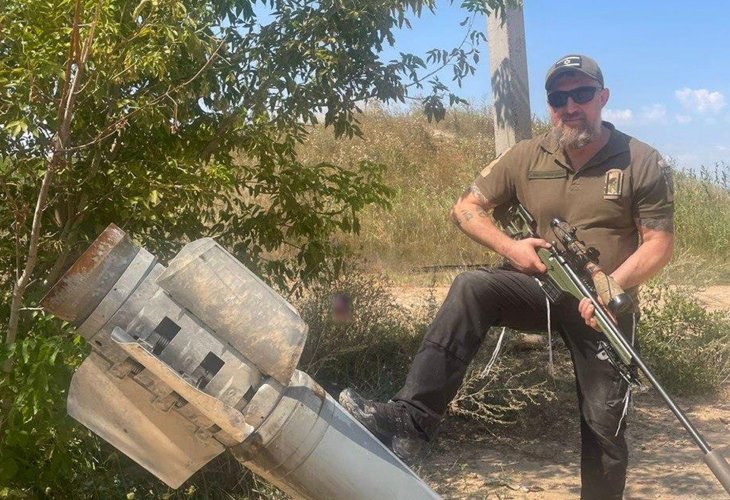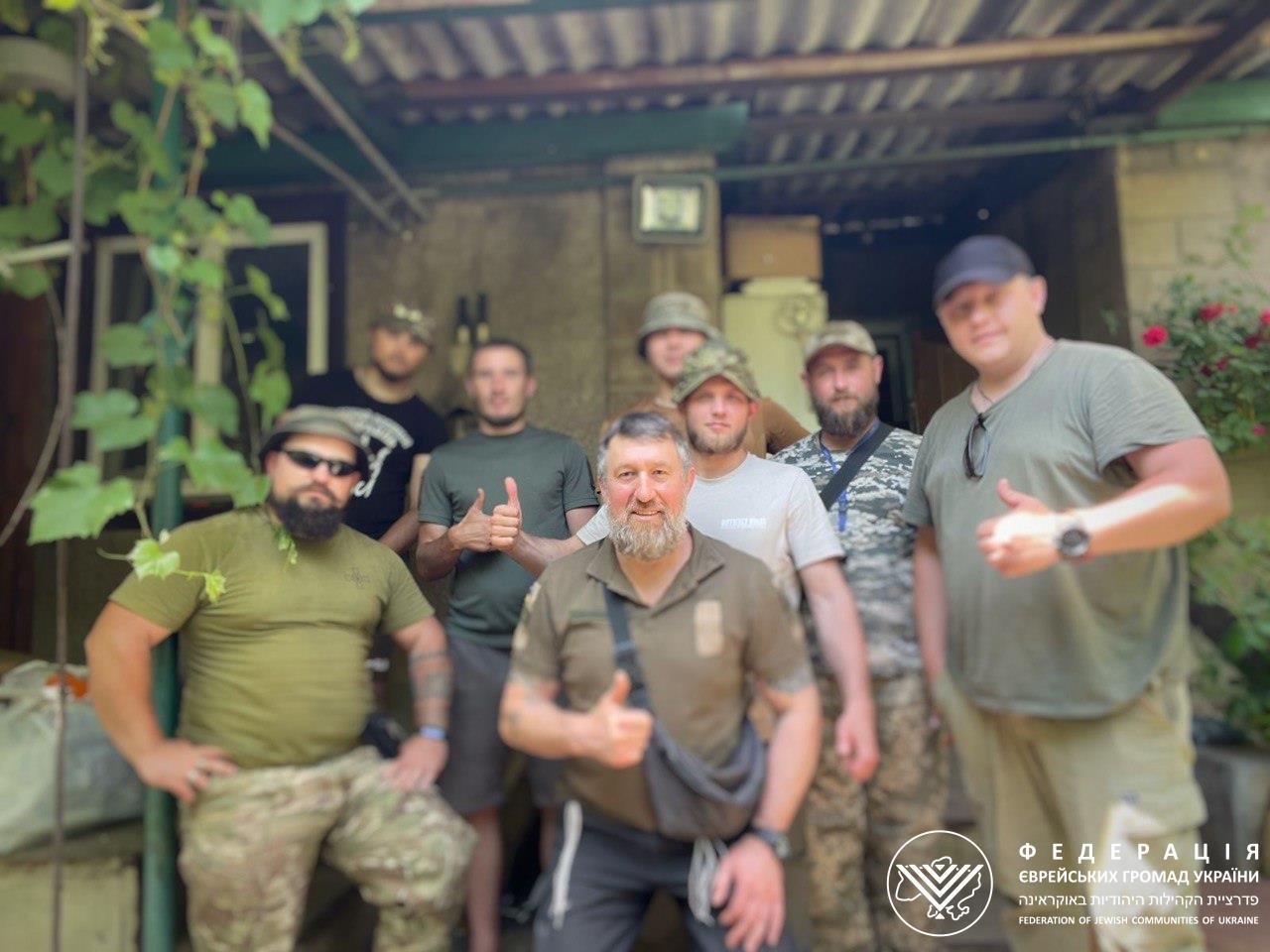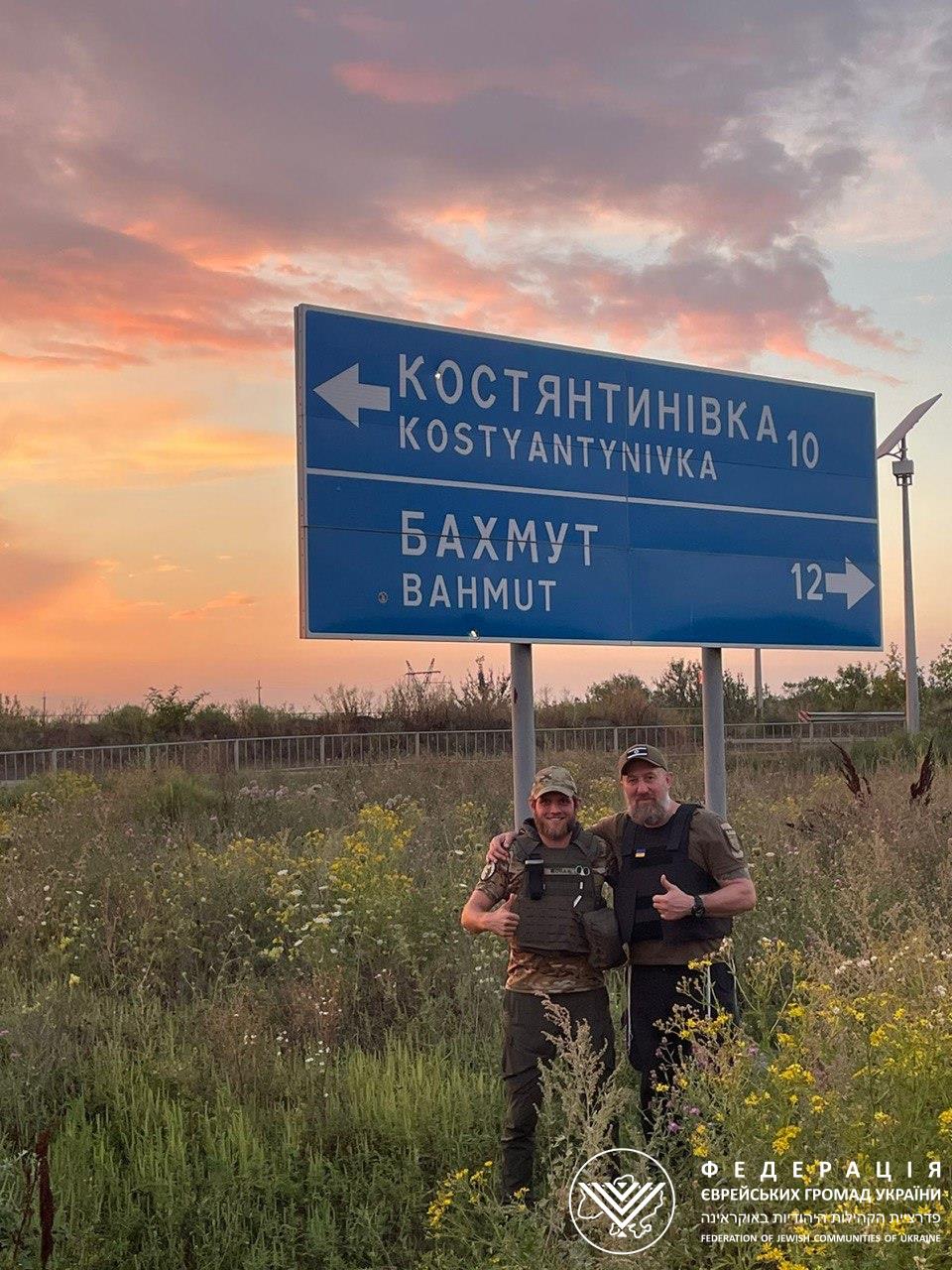The Ukrainian Military Rabbi: "The Soldiers at the Front Hope for Israel's Victory"
Rabbi Pinchas Soniakov, a military rabbi in Ukraine and a member of the Jewish Federation, visits the front lines to support the soldiers and bring Jewish soldiers closer to their heritage. In an exclusive interview, he shares his fascinating activities and the Ukrainian support for Israel.
 (Photo Credit: Federation of Jewish Communities of Ukraine - FJCU)
(Photo Credit: Federation of Jewish Communities of Ukraine - FJCU)Anyone exposed to the extensive activities of Rabbi Pinchas Soniakov, a resident of Ukraine, Chabad chassid, and member of the local Jewish Federation, might initially struggle to understand what a Jewish rabbi is doing on the dangerous front lines of the Ukrainian army. But Rabbi Soniakov does not shy away from traveling between Ukrainian military bases, from Dnipro to areas around Donetsk, with the goal of strengthening the soldiers fighting the Russian enemy, and mainly to bring Jewish soldiers closer to their Father in Heaven.
"I do not appear at the bases as a classic rabbi, but as an official religious figure on behalf of the Ukrainian military," emphasizes Rabbi Soniakov, who made a long journey to the Jewish people as a ger tzedek. "Alongside my role as a military rabbi, I am also a psychologist, which greatly helps open the gates of the bases to me. Ukrainian soldiers, who have seen one or two hair-raising things during almost two years of a war against a cruel enemy, really need my assistance."
Indeed, Rabbi Soniakov's activities are well-known in Ukrainian bases. The commanders know him, as do many of the soldiers. He visits many bases of the Ukrainian army, gathering hundreds of Ukrainian soldiers around him at the commander's instruction. Some of them are the children or grandchildren of anti-Semitic parents or grandparents or, alternatively, hold positions that see Jews as the source of evil in the world. However, at those moments, they eagerly listen to the words of the Jewish rabbi.
Soniakov was born and lives in the city of Dnipro, one of the most famous cities in Ukraine with one of the most significant economic centers in the country. This is a good enough reason for the Russians to continue attacking the city, placing its residents under real life-threatening danger. Dnipro was also one of the cities that led the shift from a pro-Russian line in Ukraine to a pro-Western stance, back when the seeds of the Russia-Ukraine war were sowed with the ousting of the pro-Russian President Viktor Yanukovych.
Discussion on the Holocaust with Ukrainian Soldiers
To visit the combat fronts and training bases of the Ukrainian army, Rabbi Soniakov requires a lot of Hashem's help. "I have connections with prominent figures in the army. They know my work and appreciate it greatly, and those among them who want me to come request the approval of senior military officials, who usually grant it," he explains the process that allows his visits to the bases.
Do you visit the front lines themselves as part of your activities?
"In most cases, I visit training bases, but I also make quite a few visits to the front," he says. According to him, the difference between the situations is noticeable: "While at training bases there is an orderly hall where I speak to the soldiers, at the front lines I speak to soldiers in the open field, or rather in a concealed area."
Aren't you afraid to visit bases on the front line?
"I am a believing Jew, and I trust in divine providence. If it is decreed that I will live, I will live anywhere, and if not, Heaven forbid, death may meet me anywhere. Besides, as someone who comes to the front to fulfill a mitzvah, I always recall the words of our sages that 'those on a mission of a mitzvah are not harmed.'
Besides the faith that accompanies me and gives me peace, I also use techniques from the world of psychology that allow me to overcome fear," Rabbi Soniakov adds. He explains that the way to calm down involves focusing on small tasks at moments when fear arises. "If, for example, fear strikes me while I'm driving, I immediately concentrate on driving and thereby manage not to think about the missile or drone that might come."
What experiences do you encounter in the war zones?
"It's of course the war atmosphere, alongside heartbreaking scenes. Like the time I arrived at a base when soldiers were removing the body of a friend who was hit by shrapnel in his sleep."
In the bases he visits, Soniakov ensures to provide spiritual and psychological support to the soldiers. "I meet soldiers from various backgrounds and ranks," he emphasizes. "Due to my military status, I meet not only Jewish soldiers—although they are certainly the main focus of my visits—but I also make sure to meet gentile soldiers and encourage their spirits. Along with this, I, of course, invest a lot in the Jewish soldiers, striving to bring them closer to their Father in Heaven."
In practice, what do your visits to the bases look like?
"Upon my entrance, the commanders order the soldiers to gather around me in a circle. Then I open up by saying, 'You are certainly wondering what I am doing here,' and, like a good Jew, continue with another question: 'Perhaps you are also asking yourselves what you are doing here.' Then I begin to talk about what we as human beings are doing in this world, and about how Hashem created a beautiful world full of trees and pleasant things, while all the destruction and ruin is a human-made creation.
And so, the conversation continues and unfolds. I take the captivated soldiers back to the days of the Holocaust and tell them about the strength Jews had to survive, all while incorporating messages about the importance of observing the Seven Laws of Noah, trying to capture the Jewish soldiers in front of me. Often, I share the history of Ukrainian Jewry and casually inquire, 'Where are the Jews here?' Once directed to the Jewish soldiers, I later continue a conversation with them, working to ignite the Jewish spark within them. Oftentimes, gentile soldiers themselves approach me and tell me where Jews are or where Jewish soldiers are currently located in the base."
What do the Jewish soldiers in the Ukrainian army look like?
"Unfortunately," he replies, "in most cases, Jewish soldiers in the Ukrainian army look identical to their gentile peers in their outward appearance. Some may refrain from eating non-kosher meat, but they won’t necessarily keep kosher and will eat the food distributed to all soldiers. It's important to note that the federation would like to further ensure the supply of kosher food for Jewish soldiers, which might prevent them from eating non-kosher food, but unfortunately does not have the financial capacity to do so."
And what moments do these meetings with Jewish soldiers create?
"Many cases are very moving for me," he shares one with us: "During a recent visit to the front, I met a Jewish sniper, who turned out to have a warm heart towards Judaism. I offered him to put on tefillin, and to my surprise, something unusual happened—he politely refused my offer. But then he explained that he refuses because he already puts on tefillin daily, so he doesn’t need my tefillin. I was very surprised to hear to what extent the Jewish spark had reached. It's important to understand that outwardly, he looked like a soldier I couldn’t imagine was Jewish, and only thanks to the testimony of his comrades did I find him.
After the initial surprise, I quickly offered him a prayer book. 'If there are already tefillin, there should also be a prayer book,' I told him. He warmly agreed, promising—though I didn’t ask—to pray daily from the book.
"In the days that followed," Rabbi Soniakov continues, "testimonies began arriving from this front. The sniper told me that since then, he has been witnessing great miracles on the battlefield, attributing these miracles to the prayer book he carries with him everywhere. To everyone's surprise, his gentile friends also began sticking close to him wherever he went. They explained that they saw how all the miracles occurred with him thanks to the prayer book.
In one instance, it saved them from death. They were in a kind of military trench on the battlefield designed to protect them from the Russian army. After a few minutes, the Jewish soldier requested to leave the trench, and the other soldiers decided to exit with him for safety. However, just then he forgot to take the prayer book with him. Shortly after leaving the trench, a bomb was launched at the spot by the Russian army, who had identified the soldiers' hideout. The trench was destroyed, but the soldiers were saved from death."

What is your goal in encouraging the gentile soldiers?
"My activities in the Ukrainian army also help in the fight against anti-Semitism," Rabbi Soniakov believes. "My primary goal is to act among the approximately 5,000 Jewish soldiers, but indirectly, other secondary objectives are also achieved. Anti-Semitism is an example of this. Gentile soldiers see a Jewish rabbi encouraging them about the war and talking about the Jewish soldiers' presence on the battlefield against the Russians. They get a sense of the Jewish people's assistance to Ukraine, and thus often change their positions."
"You must understand," he emphasizes, "the Ukrainian people are mostly believers in Hashem. In this, Ukraine is different from most of its secular European sisters, and within this believing people, my words find ways to their hearts. When I talk about faith in Hashem, the listeners nod in understanding and accept the words, not looking at me in amazement as might happen in France or Germany."
During his numerous visits to Ukrainian army bases, Rabbi Soniakov repeatedly feels the appreciation the Jewish people receive throughout the country. "In a significant number of cases, gentiles approach me and ask me to come and speak about Hashem," he notes. In one such case, when he arrived at Avdiivka near the front lines, the Christian religious figures of the base approached him and requested that he give a speech to the soldiers.
"That event was not unique," he adds. "In another case, I arrived at a training base where several Christian priests were present. To my surprise, as soon as I arrived, they approached me and said, 'You are from the blessed people, come speak before us.' So it happened that I spoke in front of about a hundred soldiers waiting to hear, as it were, about the basics of the Christian religion."
Do they ask you questions about Israel's stance on the war in Ukraine?
"Certainly. The soldiers often wonder about the lack of active support from Israel for Ukraine. Here I am very careful," he says. "Faced with this controversial topic, I try to explain Israel's position, surrounded by enemies, unable to extend its hand to wars not its own. Sometimes I simply change the subject and tell them, 'Look, I am Jewish and I am here,' or I share the Jewish soldiers' war efforts within the Ukrainian army. Agreements may not always be reached, but the tension significantly decreases after what I say to them."
What does the civilian front in the country look like?
"In my city, Dnipro, a nine-story building was recently destroyed by a Russian missile. I arrived at the scene as part of my work as a psychologist and discovered that among the fifty fatalities was an entire Jewish family who lost their lives in this tragic event. I assisted as much as possible in providing them with their last kindness," he shares sorrowfully.
However, he notes that the reports from the Jewish community in the country are mostly positive. "I see that despite the war, Jewish communities are thriving throughout all of Ukraine," he says. "In Dnipro, for instance, there is currently an active cheder despite the difficult situation. Beside the cheder stands a yeshiva, and there is also a school for girls. People pray and study in the synagogues, and Jewish life is particularly vibrant. The war also generates challenges. Such as those I encounter when visiting other cities, where it becomes clear there is no permanent rabbi. In each such place I try to be there for some time, serve as their rabbi, and even spend Shabbat with them to bring the light of Judaism to them."
The Ukrainians Want Israel to Win
How does Ukraine view the war that erupted between Israel and Hamas?
"Of course, I am not authorized to speak on behalf of the military, but I speak as a Jew, a soldier, and a Ukrainian citizen: From what I see and hear – Ukraine has great admiration for Israel and sees it as a model of military power and a symbol of few against many enemies surrounding it, exactly like us being numerically few against Russia. Like us, Israel's spirit is stronger than anything. It's clear that we, residents of Ukraine, have our troubles in the form of the harsh war imposed on us, but we talk about what's happening in Israel and hope for its victory. Also, the fact that Russia sides with Gaza creates great sympathy for Israel among the public here."

Do they believe Russia is involved in this war?
"Anyone with common sense understands, even if Russia is not directly involved in the war in Gaza, that the Russians support Hamas. This can be seen in their propaganda broadcasts and in that Putin and his cohorts condemn Israel. It's simply scandalous that this man dares to condemn Israel while he truly does horrific and terrible things. I don't understand his gall to compare the Israeli siege on Gaza to the Nazi siege on Stalingrad during World War II. It's simply enraging. If someone dared to enter Russian territory and kill hundreds of citizens in atrocious ways, as they did to you in Israel, Putin would annihilate the enemy along with their children and women. He has done it before in Chechnya."
A concluding message?
"Ukraine cries out for military aid, and Israel could have provided it. Now it is apparently not relevant because you need weapons yourselves, but you could have done more for us. Your policymakers didn't want to upset the Russian bear, but it smelled your weakness and therefore disdains you. Just as you want the world to support your justified struggle against Gaza, so too we needed your military support against the Russians. Both here and there, it is a war of justice versus hatred, of the children of light against the children of darkness," concludes Rabbi Soniakov.

